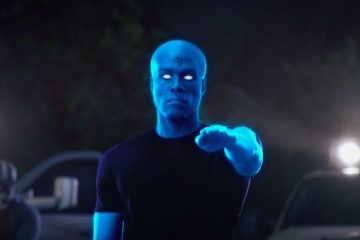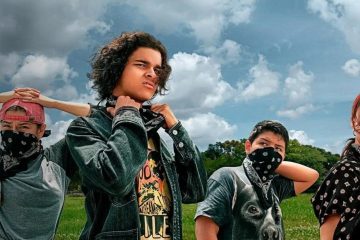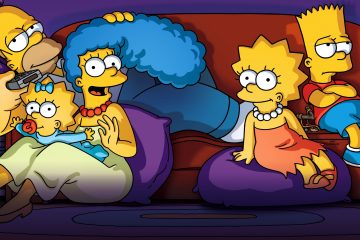This is part of a series, offered during the Northern hemisphere’s summer of 2023. I thought I’d roll through the various streaming services that I have, and list some of the TV shows I like there. The idea is to give guidance for a quick subscription – if you’re going to get the free trial, maybe add a month or two, then get out, what should you watch? I haven’t seen everything, of course, nor do I wish to, and I’m an individual with particular tastes and bents, so this isn’t “the best of” any platform: it’s simply a list of the shows I’d recommend.
For the final entry in this series, we get to the streaming beast that is Netflix. There’s a lot I watch on Netflix, but I’m actually a bit surprised at how the list didn’t bloat too much: I guess Netflix is really good for B+ television, less good television for A television. The list includes shows only if they’ve been in active production in last 5 years (sorry, Nanette).
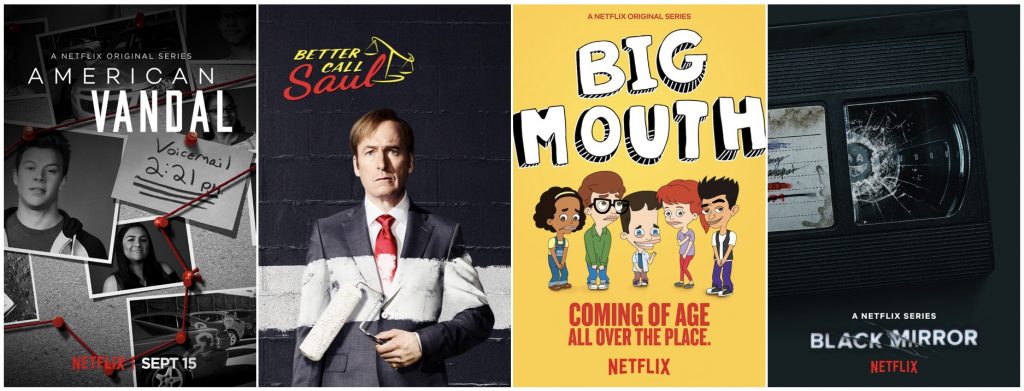
American Vandal (2017-2018) starts as a faux true crime show trying to determine who spraypainted penises on the teachers’ cars in a high school parking lot. Season 2 follows up with the equally serious investigation into a series of poop crimes by The Turd Burglar. So, yes, the premise is very sophomoric. But this show is so much smarter than that premise. Hilarious throughout, with pitch perfect parody, it’s also one of the best shows about high school life, and starts our list in style, since it’s one of Netflix’s very best shows.
Better Call Saul (2015-2022) is one of the few shows on this list not actually produced by Netflix: it just comes here to chill after screening on AMC. Nominally a spinoff of Breaking Bad tracking Saul Goodman’s life before Breaking Bad, you don’t need to know BB, and to my mind it’s way better anyways. Bob Odenkirk, Rhea Seehorn, and Michael McKean deliver brilliant performances, and the show strikes a neat balance of being high gloss, fun, funny, and deadly serious.
Big Mouth (2017- ), like American Vandal, sounds lower rent than it is. An animated show about teenagers going through puberty, that adds anthropomorphized hormones, depression, shame, and more to the cast, it certainly has fun with grossout humor and is hardly cerebral … but its commentary about and framing of puberty is often refreshingly sophisticated and caring. I’m not sure I’d recommend it to a 13 year-old, but they’d learn one hell of a lot that I never learned till much later if they did watch.
Black Mirror (2011- ) is now one of Netflix’s oldest shows, loosely an anthology show often set in a near future in which a technological development is central to the plot. Creator Charlie Brooker regularly veers into dystopian views of everything from retinal computers to ubiquitous rating systems. But some of its best episodes happen when the dystopia is put on hold, as in the beautiful “San Junipero” and “Be Right Back.” Recent release “Joan is Awful” also excels by keeping its sense of humor (something Brooker doesn’t allow himself as much of in the show, but that puts him in his comfort zone).
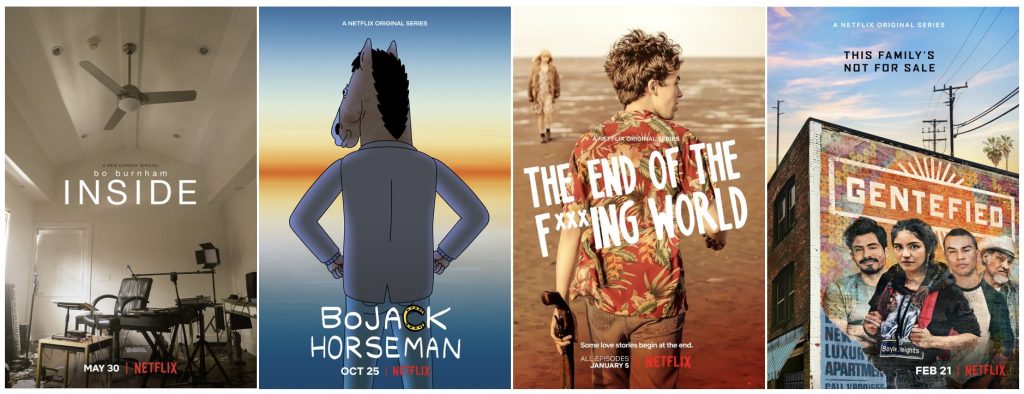
Bo Burnham: Inside (2021) is an excellent comedy special. Filmed during the pandemic, it’s one part Weird Al Yankovic, one part cry for help, one part hilarious sketch show, one part weird vibe. I could see some viewers finding that mix eclectic, or wanting more of one, less of the others. But I found the balance stunning and resonant.
BoJack Horseman (2014-2020) is one of Netflix’s best shows, the at-first-seemingly-stupid show about a struggling half man, half horse star, that ends up saying more about many issues – depression, celebrity, abuse – than many more earnest, serious shows manage. It’s a bit hit-and-miss, so some eps sink while others sink beautifully (if you know you know).
The End of the F***ing World (2017-2019) is guaranteed to feel different from almost anything else you’ve watched on television. The short eps could’ve been strung together to make an (overlong) indie film, but it works really well as a show. About two teens who hate their existence and try to team up to run away and find something better; except of course things don’t really get better. Fresh and insightful, smart and very watchable.
Gentefied (2020-2021) is an American television rarity, focusing on a Latino family in Boyle Heights, LA. This is an excellent show. Some of the characters start as archetypes, but all luckily grow, due in part to a strong script and equally strong performances. It’s about gentrification but walks around that topic and never gives you a single line of approach, becoming all the smarter and more interesting as a result.
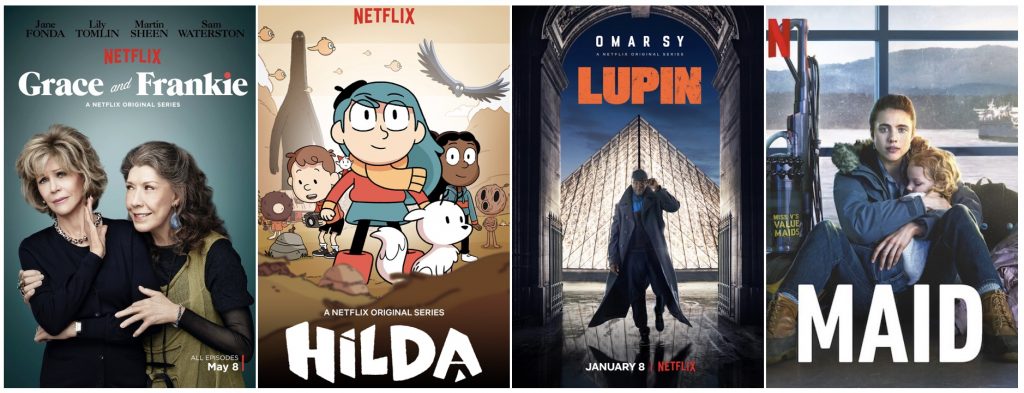
Grace and Frankie (2015-2022) is just good fun. Lily Tomlin and Jane Fonda play old friends whose husbands came out and married each other. So few shows care about old people, much less old women, and Fonda and Tomlin find almost every bit of fun and play in the script that they can, Martin Sheen and Sam Waterston finding the rest as their ex-husbands.
Hilda (2018- ) is an excellent animated series based on the graphic novel about the titular figure living in a town surrounding by trolls and other strange creatures. Bella Ramsey justifiably got a lot of love for her portrayal of Game of Thrones’s Lady Lyanna Mormont, but deserved every bit as much for her Hilda. I appreciate the mix of weirdness, strangeness, and decent kids’ programming.
Lupin (2021- ) is a fun French show about an expert “gentleman” thief who turns his skills towards exacting retribution on a rich man who ruined his family as a kid. I watched the show dubbed and was very impressed by the acting of the lead dubber, though I’m told the original is way better, should your French be stronger than mine (and some supporting cast have horrible dubbing, be warned). But either way, the careful scripting and staging allows for episodes that feel tight and smart but that are always fun and never too taxing.
Maid (2021) stars Margaret Qualley as a poor mother in Seattle trying to get by, despite an abusive partner, a troubled mother (played by Qualley’s own mom, Andie McDowell), and a useless father. It’s not without its problems and stereotypes, but I appreciate that it’s at least trying to talk about poverty and being working class in a medium most known for its upper middle class characters. Qualley is excellent, and McDowell offers her only performance I’ve ever not found annoying, making this worth the watch.
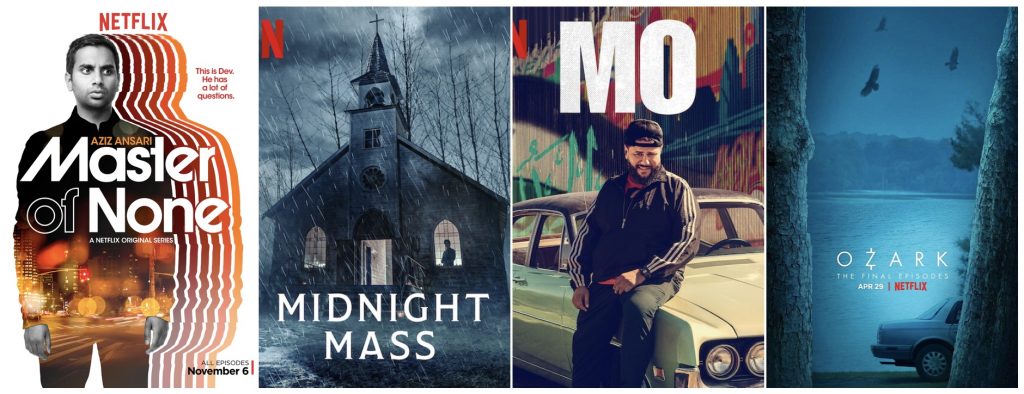
Master of None (2015-2021) is an interesting show, beginning as a show about Aziz Ansari’s Dev Shah, before turning to his friend Denise (Lena Waithe) in season 3. The show oscillates between romcom seriality and one-off issue eps, and I much prefer the latter, but I know others who prefer the former, so there’s that. Some excellent episodes that find a sweet spot between issues and hilarity.
Midnight Mass (2021) is the third of Mike Flanagan’s Netflix horror shows. These seem to be quite divisive, but I’ll admit to liking them all, and this is the best of them. Granted, after Friday Night Lights, I’d watch Zach Gilford in pretty much anything, and he’s excellent here, but the story walks an interesting line between having some things to say about religiosity and wanting to make you shit yourself.
Mo (2022- ) is wonderfully original. How many other shows do you know about Palestinian-Americans in suburban Texas with Latina girlfriends? But it rarely leads with Issues, as the cast are darn funny, and the show has the confidence to do a lot of its best work quietly and through strong character comedy. Okay, so s.1 has a stupid, stupid ending, but I’ll forgive it that after an otherwise excellent season.
Ozark (2017-2022) somehow managed to turn off a lot of people, mostly perhaps because they seemed to think they were meant to like Jason Bateman and Laura Linney. Don’t try to do that. But the two are superb as a Chicago couple who end up getting deeper and deeper into criminal life after Marty (Bateman) starts laundering money. Julia Garner is a stand out, but so many of the cast offer up top-notch performances, and I ended up loving the show’s flirting with audiences’ senses of identification.
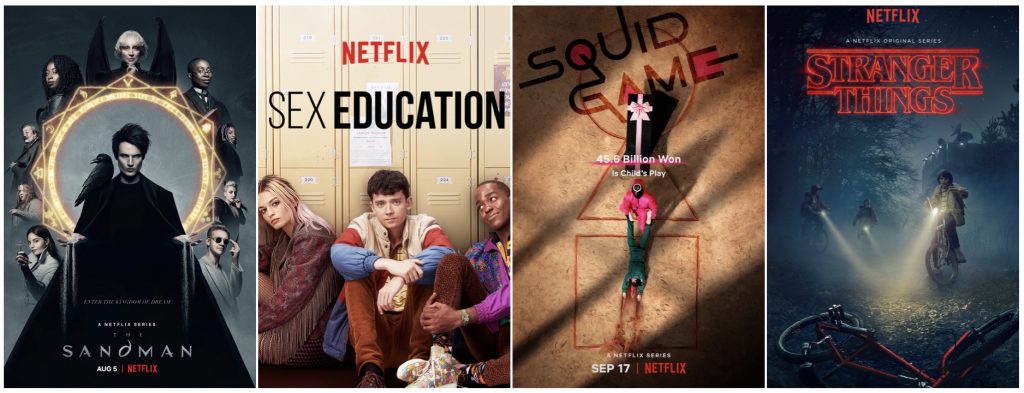
The Sandman (2022- ) adapts Neil Gaiman’s iconic graphic novel about Morpheus’/Dream’s development as character and being. There’s a lot happening here, and the show does a superb job reigning it all in. “The Sound of Her Wings” stands out as my favorite episode of television in the last couple of years, with two beautiful stories about death/Death and connection. As you should expect from Gaiman, there’s a fun mix of myth, whimsy, and depth. And Tom Sturridge is unnervingly good as the graphic novel lead.
Sex Education (2019- ) follows a sex therapist (Gillian Anderson)’s son (Asa Butterfield)’s own attempts to dispense sex counseling to his high school. It is funny and a lot of fun, but it’s also charming, inasmuch as it’s guided by an ethos of really caring to consider where people are coming from, and why they’re acting as they are: even when a character seems utterly 2-dimensional, wait a season at most and you’ll get more depth. I’ve thus come to care about way more of the characters than is usual even in other excellent shows. Ted Lasso gets the public plaudits for being feel-good caring TV, but this deserves the same reputation.
Squid Game (2021- ) traps 200 people in a game where only the winner lives. Korean Netflix sensation that it was, you’ve surely heard of it and probably seen it already. But if you haven’t, it’s well worth the time, as the characters are interesting, the dilemmas squirmy but gripping. It’s also brilliantly filmed.
Stranger Things (2016- ) follows a group of tweens and teens protecting their town from all manner of, well, strange things. It’s a wonderful study in intertextuality, both intensely derivative of seemingly every American horror, thriller, action, or teen film from the 80s, and yet original and interesting. I also appreciate that it never gets strangled by its nostalgia, and it’s – sometimes subtly, sometimes loudly – willing to revise and edit 80s film tropes when they need work. As a result, it’s a big ball of Steven Spielberg, Stephen King, and more rolled into a show that keeps delivering season after season.
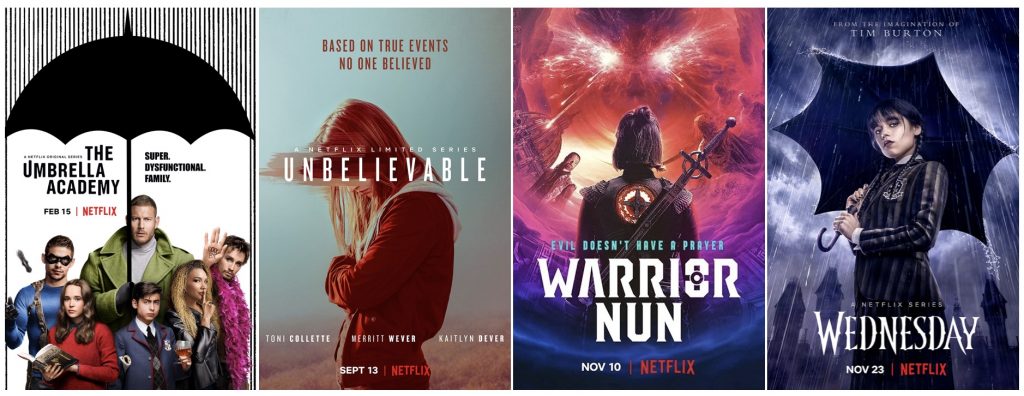
The Umbrella Academy (2019- ) is weird superhero show, following a “family” trained by their eccentric “father” to become a team, then brought together in adulthood to face all manner of time-traveling havoc. Aidan Gallagher’s Number Five is a highlight – an old man in a tween body, and Robert Sheehan has more fun with his Klaus than most actors are allowed to have in a career. It’s pitchy, as is to be expected with time-traveling shows with talking monkeys, superpowers, and mysterious briefcases, but it’s always been worth my time.
Unbelievable (2019) bases itself off a true story (and a This American Life episode) of the hunt for a serial rapist. It’s not at all easy to watch, but a strong cast and script make it one of the better shows about rape, not least of all because it eschews the icky male gaze and dude-ish perspectives that too often enshroud such narratives. Kaitlyn Dever proves her immense acting chops yet again, while Merritt Weaver and Toni Collette make a good detective duo.
Warrior Nun (2020-2022) has distinct Buffy the Vampire Slayer vibes: a secret sisterhood of (warrior) nuns is sworn to protect the planet and to assist a super-powered chosen one. Season 2 crumbles a bit, but the cast keep it moving along otherwise, as does a script full of bad-ass Mother Superiors, Hell on Earth, worrisome popes, interdimensional portals, and more.
Wednesday (2022- ) wasn’t something I expected much from, but Jenna Ortega as Wednesday, Emma Myers as the awesome Enid, and co. bring a lot of life (or in keeping with the IP, is that a lot of death?) to this show about the titular member of the Addams Family. Oozing in Tim Burtonesque style and (lack of) color palette, it walks a nice line between comedy and detective thriller, always giving the characters something to do, while leaving them fun ways to do it. Best supporting performance by a single hand in 2022 too.
